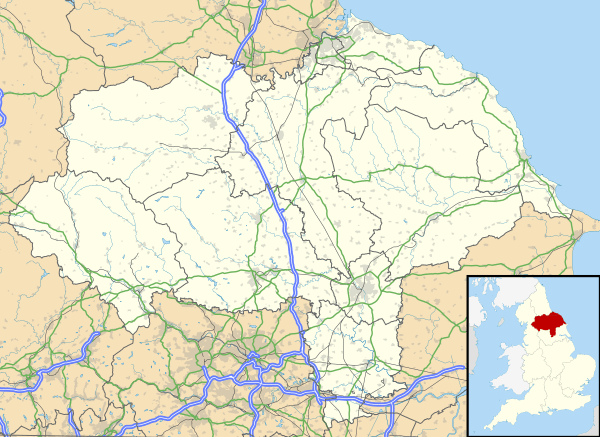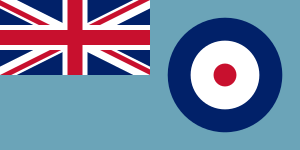RAF Linton-on-Ouse
RAF Linton-on-Ouse (IATA: HRT, ICAO: EGXU) is a Royal Air Force station at Linton-on-Ouse in North Yorkshire, England, 10 miles (16 km) north-west of York. It has satellite stations at RAF Topcliffe and Dishforth Airfield (British Army).
| RAF Linton-on-Ouse | |||||||||
|---|---|---|---|---|---|---|---|---|---|
| Near Linton-on-Ouse, North Yorkshire in England | |||||||||
 The old air traffic control tower at RAF Linton-on-Ouse. | |||||||||
 | |||||||||
 RAF Linton-on-Ouse Shown within North Yorkshire | |||||||||
| Coordinates | 54°02′56″N 001°15′10″W | ||||||||
| Type | Royal Air Force training station | ||||||||
| Site information | |||||||||
| Owner | Ministry of Defence | ||||||||
| Operator | Royal Air Force | ||||||||
| Controlled by | No. 22 Group (Training) | ||||||||
| Website | www | ||||||||
| Site history | |||||||||
| Built | 1936/7 | ||||||||
| In use | 1937–Present | ||||||||
| Garrison information | |||||||||
| Current commander | Wing Commander Howard Newbould | ||||||||
| Occupants | |||||||||
| Airfield information | |||||||||
| Identifiers | IATA: HRT, ICAO: EGXU, WMO: 03266 | ||||||||
| Elevation | 16.2 metres (53 ft) AMSL | ||||||||
| |||||||||
| Source: RAF Linton-on-Ouse Defence Aerodrome Manual[2] | |||||||||
With the transfer of pilot training to RAF Valley on Anglesey, the RAF confirmed that it would vacate Linton-on-Ouse by 2020 and look to dispose of the site altogether.[3]
History
RAF Linton-on-Ouse opened on 13 May 1937 as a bomber airfield and was the home of No. 4 Group RAF until 1940.[4] The base's first commander was Wing Commander A.D.Pryor.[5]
When the Second World War began, bombers were launched from Linton to drop propaganda leaflets over Germany[4] and the base was eventually used to launch bombing raids on Norway, The Netherlands, Germany, and Italy.[4] Linton was one of 11 stations allocated to No. 6 Group, Royal Canadian Air Force during the war.[6]
In May 1941 the station was bombed by the Luftwaffe resulting in the death of 13 airmen including the station commander, Group Captain Garroway.[7]
At the end of the war the station was involved with transporting passengers and freight back to the UK.[8] After which it became a Fighter Command station operating the Gloster Meteor, Canadair Sabre and Hawker Hunter until it was closed and put under care and maintenance in 1957.[8]
On 9 September 1957,[8] the base was reopened as the home of No. 1 Flying Training School (FTS) and was responsible for training pilots for both the RAF and the Navy.[8]
In October 1975 Headquarters No. 23 Group RAF disbanded at the station.[9]
In 1981 the BBC filmed episode 5 'Chopped' of the Fighter Pilot series at the base. Chief Flying instructor at the time was Squadron Leader John David Lunt (Later Group Captain).[10]
In 1985, engineering and supply services were contracted out to private firms. The contract for this is currently held by Babcock International.[11][12]
In 1999 the entire NCO married quarter site at Linton Woods were purchased by The Welbeck Estate Group and underwent a major upgrade.[13]
In October 2014 it was confirmed by the Ministry of Defence (MOD) that basic fast-jet training will move from Linton-on-Ouse to RAF Valley in Anglesey in 2019. The move is part of the UK Military Flying Training System (UKMFTS) which will see the Beechcraft Texan T1 replace the Tucano T1 in the basic fast-jet training role.[14] At that time, the MOD did not confirm what future role Linton-on-Ouse would have, but in July 2018, it was stated that the RAF would vacate the base by 2020 and it would be disposed of completely.[15][16] However, in March 2019, the MOD was considering options for other defence uses for the site, before a final decision is made on disposal.[17]
Flying training ceased in October 2019.[18]
Role and operations
Flying training
The Yorkshire Universities Air Squadron relocated to RAF Linton-on-Ouse from RAF Church Fenton in 2014. YUAS operate the Grob Tutor T1 aircraft.[19]
72(R) Squadron previously provided Basic Fast Jet Training (BFJT) at Linton-on-Ouse on the Short Tucano T.1 before the Squadron’s move to RAF Valley in November 2019.[20]
Other operations
The station also houses a memorial room (limited public opening) which recounts the history of the base and the units which have been associated with it.[21][22]
No 4 Squadron Royal Air Force Police, who form part of 1 Police Wing, RAF Police, are responsible for the policing and security of RAF Linton-on-Ouse and its satellite stations. RAF Police personnel also deploy on operations throughout the world from this role.[23][24][25]
Based units
The following notable flying and non-flying units are based at RAF Linton-on-Ouse.[26][27]
Royal Air Force
- No. 6 Flying Training School
- Yorkshire Universities Air Squadron – Grob Tutor T1
- No. 9 Air Experience Flight – Grob Tutor T1
- Air Training Corps
- North Region Headquarters
- Central and East Yorkshire Wing Headquarters
- No. 2487 (Linton-on-Ouse) Detached Flight
- No. 4 Royal Air Force Police Sqn
European Defence Agency
- Helicopter Composite Air Operations (COMAO) Planning Course
Motorsport
| Location | Yorkshire, England |
|---|---|
| Opened | 1960 |
| Closed | 1961 |
| Website | www |
In the summer of 1960 and 1961, the perimeter track and parts of two runways were used to form the 1.7 mile, Linton-on-Ouse circuit, on what was still an operational RAF base, with the racing organised by the Northern of the British Racing and Sports Car Club. The 1960 meeting was held in torrential rain and Tony Hodgetts recalls blue sparks coming off his fingers as he cranked the field telephone which was used by the marshals to communicate with race control. The meeting was dominated by Jimmy Blumer in his Cooper Monaco. The final meeting in 1961 was marred by a fatal accident to a flag marshal. The driver of the Formula Junior car involved was a serving RAF officer and, following the inquest into the death of the marshal, the venue was no longer available. After this sad incident and a near fatality to another flag marshal at Full Sutton Circuit, Tony Hodgetts and Garth Nicholls started a campaign which resulted in flag marshals working face to face instead of back to back, a system which is still in use and is considerably safer.[28]
November 2008 incident
In early November 2008 Wing Commander Paul Gerrard, who is based at the station, was involved in an unusual mid-air rescue. Sixty-five-year-old Jim O'Neill was flying a four-seater Cessna 182 from Scotland to Essex after a family holiday, when he had a stroke which caused temporary blindness. Gerrard was on a training flight, and after being alerted to the situation, located O'Neill's aircraft and over a 45-minute period, guided O'Neill to a safe landing at Linton.[29]
See also
References
- Pine, L G (1983). A Dictionary of Mottoes. London: Routledge & Kegan Paul. p. 1. ISBN 0-7100-9339-X.
- "RAF Linton-on-Ouse Defence Aerodrome Manual (DAM)" (PDF). RAF Linton-on-Ouse. Military Aviation Authority. 27 June 2014. Retrieved 24 August 2017.
- "Royal Air Force". Royal Air Force. Retrieved 16 June 2020.
- Halpenny, Bruce Barrymore Action Stations: Military Airfields of Yorkshire v. 4 – Page 122
- 1938 Air Force Lists
- Dunmore 1991, p. 4.
- "Bombing raid mystery is solved at RAF Linton-on-Ouse". York Press. Retrieved 26 August 2018.
- Halpenny, Bruce Barrymore Action Stations: Military Airfields of Yorkshire v. 4 – Page 130
- Barrass, M. B. (2015). "Groups 20–29". Air of Authority – A History of RAF Organisation. Retrieved 29 April 2015.
- "Fighter Pilot episode 5 'Chopped'". BBC. Retrieved 17 March 2020.
- "Babcock". RAF Linton-on-Ouse. Retrieved 17 December 2016.
- "Air". Babcock International. Archived from the original on 27 October 2015. Retrieved 5 June 2017.
- "Relatives of hero pilot visit building named in his honour". www.raf.mod.uk. Archived from the original on 1 February 2008. Retrieved 8 July 2019.
- "RAF pilot training boost welcomed". BBC News. 25 October 2014. Retrieved 20 February 2018.
- "Future of RAF Linton-on-Ouse airbase in doubt". York Press. 31 October 2014. Retrieved 20 February 2018.
- Witherow, John, ed. (24 July 2018). "Red Arrows base axed in cost-cutting manoeuvre". The Times (72595). p. 7. ISSN 0140-0460.
- Ellwood, Tobias (25 March 2019). "RAF Linton-on-Ouse: Closures:Written question - 234753". UK Parliament. Retrieved 25 March 2019.
- Sedgwick, Philip (1 November 2019). "Final chapter in flight operations". Darlington and Stockton Times (44–2019). p. 66. ISSN 2516-5348.
- "The History of Yorkshire Universities Air Squadron". UAS. Royal Air Force. Retrieved 8 June 2016.
- "Royal Air Force". Royal Air Force. Retrieved 8 January 2020.
- Delve 2006, p. 183.
- "RAF Linton-on-Ouse Memorial Room". RAF website. 2017. Retrieved 9 March 2017.
- "RAF - News by Date". www.raf.mod.uk. Retrieved 3 June 2017.
- "Road safety training for youngsters at Easingwold School". York Press. Retrieved 3 June 2017.
- "RAF - News and Weather". www.raf.mod.uk. Retrieved 3 June 2017.
- "RAF Linton-on-Ouse – Who's Based Here". Royal Air Force. Retrieved 16 July 2018.
- "EDA helps improve joint helicopter mission planning". European Defence Agency. 20 November 2017. Retrieved 16 July 2018.
- Swinger, Peter (2008). Motor Racing Circuits in England : Then & Now. Ian Allan Publishing. ISBN 0 7110 3104 5.
- Wainwright, Martin (8 November 2008). "Pilot Struck blind in flight shepherded to safe landing by RAF". The Guardian. Retrieved 10 November 2008.
Bibliography
- Delve, Ken. The military airfields of Northern England – County Durham, Cumbria, Isle of Man, Lancashire, Merseyside, Manchester, Northumberland, Tyne & Wear, Yorkshire. Marlborough, Wiltshire, UK: Crowood Press, 2006. ISBN 1-86126-809-2.
- Dunmore, Spencer and William Carter. Reap the Whirlwind: The Untold Story of 6 Group, Canada's Bomber Force of World War II. Toronto, Ontario, Canada: McLelland and Stewart Inc., 1991. ISBN 0-7710-2924-1.
External links
| Wikimedia Commons has media related to RAF Linton-on-Ouse. |
- RAF Linton-on-Ouse
- 642 Volunteer Gliding Squadron
- Airport information for EGXU at World Aero Data. Data current as of October 2006.
